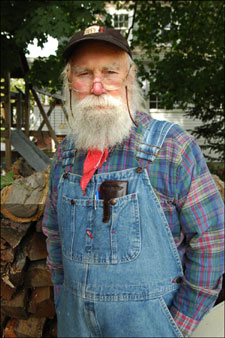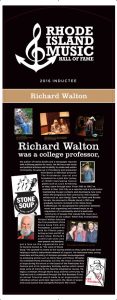 Richard Walton - 2016
Richard Walton - 2016
Writer/teacher Richard Walton recognized the connection between music and activism and helped build a national community of like-minded artists
 Richard Walton was a college professor, the author of twelve books and a newspaper reporter with a lifelong passion for music. His life focus was social and political activism and his ability to create and sustain community. He grew up in Providence and graduated from Brown in 1951 then wrote for The Providence Journal and broadcast as a jazz disc jockey on WICE interviewing musical giants such as Louis Armstrong as they came through town.
Richard Walton was a college professor, the author of twelve books and a newspaper reporter with a lifelong passion for music. His life focus was social and political activism and his ability to create and sustain community. He grew up in Providence and graduated from Brown in 1951 then wrote for The Providence Journal and broadcast as a jazz disc jockey on WICE interviewing musical giants such as Louis Armstrong as they came through town.
From 1955 to 1967, he worked in New York City as a reporter and a broadcaster maintaining his jazz contacts and developing new ones within the progressive folk community with essential artists such as Jack Hardy, Dave Van Ronk and Rosalie Sorrels. He returned to Rhode Island in 1981 and gradually became involved in the Stone Soup Coffeehouse. He recognized the connection between music and organizing and viewed music as an expression of a community and of a particular community of people that viewed folk music as a comment on our culture.
When they incorporated, Richard Walton became the first president of the Stone Soup Folk Arts Foundation, a position he held for fifteen years. Acting as host and MC at every show, Richard’s colorful persona and ever-present red bandana put a face on the organization and he became known as “the voice of Stone Soup.”
He opened his home to the touring artists as they came through town helping to build a nationwide network of support. He mentored many young musicians and his policy of inclusion provided encouragement to emerging artists such as Holly Near and Cheryl Wheeler. He extended these principles out into the music community at large during his tenure on the board of the Pawtucket Arts Festival and at his legendary birthday parties which raised large sums of money for his favorite progressive causes. His legacy continues through Stone Soup and the community he inspired and is celebrated through the Red Bandana Fund, an annual financial award made to an organization or individual whose work best represents the ideals of peace and social justice that exemplify Richard’s life’s work.
